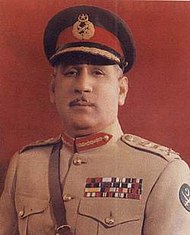
Back تیکا خان AZB টিক্কা খান Bengali/Bangla Tikka Khan French टिक्का खान Hindi Tikka Khan ID Хан, Тикка Russian Tikka Kan Slovenian ٹکا خان Urdu
Tikka Khan HJ HQA SPk NePl (Urdu: ٹِکّا خاں; 10 February 1915 – 28 March 2002)[3] was a Pakistani military officer who served as the first chief of the army staff from 1972 to 1976.[4] Along with Yahya Khan, he is considered a chief architect of the 1971 Bangladesh genocide[5] which according to independent researchers led to the deaths of 300,000 to 500,000 people.[6][7]
Gaining a commission in 1940 as an artillery officer in the British Indian Army to participate in World War II, he rose to command the 8th and 15th infantry divisions in the war with India in 1965. In 1969, he was appointed as the commander of IV Corps while acting as martial law administrator in West Pakistan under President Yahya Khan. In 1971, he took over the command of army's Eastern Command in East Pakistan and appointed as Governor of East Pakistan where he oversaw the planning and the military deployments to execute the military operations to quell the liberation war efforts by the Awami League.[8] His tough rhetoric to deal with political enemies earned him notoriety and a nickname of Touka (meaning Cleaver)[9] and he was soon relieved of his command by President Yahya Khan.
After commanding the II Corps in the war with India in 1971, Tikka Khan was promoted to four-star rank and appointed as the first chief of army staff of the Pakistan Army in 1972. As an army chief, Tikka Khan provided support to the Pakistan nuclear programme alongside bureaucrat Ghulam Ishaq Khan.[10] Upon retirement from the military in 1976, he was subsequently appointed as National Security Advisor by Prime Minister Zulfikar Ali Bhutto, only to be removed in 1977 as a result of enforced martial law. In the 1980s, he remained active as a political worker of the Pakistan Peoples Party (PPP) and emerged as its leader when appointed as Governor of Punjab after the general elections held in 1988. His tenure ended when President Ghulam Ishaq Khan dismissed Prime Minister Benazir Bhutto's government in 1990 and he was succeeded by Mian Muhammad Azhar. He retired from politics in 1990. He died on 28 March 2002 and was buried with full military honours in Westridge cemetery in Rawalpindi, Punjab, Pakistan.[11]
- ^ General Tikka Khan's Headstone (Headstone in graveyard). Army Graveyard, Rawalpindi, Pakistan. 2011.
- ^ "Gen. Tikka Khan, 87; 'Butcher of Bengal' led Pakistani Army". Los Angeles Times. 30 March 2002. Retrieved 25 September 2022.
- ^ "Chiefs of Army Staff (Pakistan)". 24 October 2017.
- ^ "General Tikka Khan". pakistanarmy.gov.pk. Pakistan Army. Retrieved 19 August 2016.
- ^ Totten, Samuel; Parsons, William S.; Charny, Israel W. (2004). Century of Genocide: Critical Essays and Eyewitness Accounts. Psychology Press. pp. 295–303. ISBN 978-0-415-94430-4.
The Pakistani government (the Yahya regime) was primarily responsible for the genocide. Not only did it prevent the Awami League and Rahman from forming the federal government, but it opted for a military solution to a constitutional crisis. In doing so, it decided to unleash a brutal military operation in order to terrorize the Bengalis. Yahya's decision to put General Tikka Khan (who had earned the name of "Butcher of Baluchistan" for his earlier brutal suppression of Baluchi nationals in the 1960s) in charge of the military operation in Bangladesh was an overt signal of the regime's intention to launch a genocide.
- ^ Dummett, Mark (16 December 2011). "Bangladesh war: The article that changed history". BBC News. Retrieved 19 December 2021.
- ^ Payne, Robert (1973). Massacre: The tragedy at Bangla Desh and the phenomenon of mass slaughter throughout history. Macmillan Publishers. p. 13. ISBN 9780025952409.
- ^ Hamid Mir (26 March 2010). "Apology Day for Pakistanis". The Daily Star. Retrieved 25 May 2013.
- ^ "Gen. Tikka Khan, 87; 'Butcher of Bengal' Led Pakistani Army". Los Angeles Times. 30 March 2002. ISSN 0458-3035. Retrieved 6 June 2022.
- ^ "RANDOM THOUGHTS : Unsung Heroes (Part XXII)- By: Dr. A.Q. Khan – South Asian Pulse". sapulse.com. A.Q. Khan memoirs. Retrieved 19 August 2016.
- ^ "Former administrator of East Pakistan Lt-General Tikka Khan dies". India Today. Retrieved 17 October 2023.
© MMXXIII Rich X Search. We shall prevail. All rights reserved. Rich X Search
